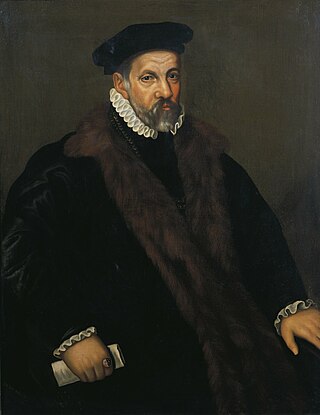Related Research Articles

Theodore Beza was a French Calvinist Protestant theologian, reformer and scholar who played an important role in the Protestant Reformation. He was a disciple of John Calvin and lived most of his life in Geneva. Beza succeeded Calvin as the spiritual leader of the Republic of Geneva.
Barnabe Googe, also spelt Barnabe Goche and Barnaby Goodge, was a poet and translator, one of the earliest English pastoral poets.

Sir Robert Filmer was an English political theorist who defended the divine right of kings. His best known work, Patriarcha, published posthumously in 1680, was the target of numerous Whig attempts at rebuttal, including Algernon Sidney's Discourses Concerning Government, James Tyrrell's Patriarcha Non Monarcha and John Locke's Two Treatises of Government. Filmer also wrote critiques of Thomas Hobbes, John Milton, Hugo Grotius and Aristotle.
Edward Aglionby was an English Member of Parliament, official, translator and poet. He was closely associated with the Dudley family.
William Damasus Lindanus or Van der Lindt was a 16th-century Bishop of Roermond and Bishop of Ghent.

Thomas Wilson (1524–1581), Esquire, LL.D., was an English diplomat and judge who served as a privy councillor and Secretary of State (1577–81) to Queen Elizabeth I. He is remembered especially for his Logique (1551) and The Arte of Rhetorique (1553), which have been called "the first complete works on logic and rhetoric in English".
Peter Osborne, Esquire, (1521–1592) was an English officer of state who was Keeper of the Privy Purse to King Edward VI, at a time when great constitutional changes affected the management of public finance. Of reformist sympathies in religion, his career was in abeyance during the reign of Queen Mary but regained momentum as Remembrancer in the Exchequer under Elizabeth, working usually to his marital kinsman Lord Burghley. He also sat in seven parliaments between 1559 and 1589.
John Ryder (1562–1632) was a lexicographer who published an English-Latin Dictionary that was widely used in the 17th century. A favourite of Elizabeth I, he was Dean of St. Patrick's Cathedral, Dublin, and the Anglican Bishop of Killaloe.
A Christian Hebraist is a scholar of Hebrew who comes from a Christian family background/belief or is a Jewish adherent of Christianity. The main area of study is that commonly known as the Old Testament to Christians, but Christians have occasionally taken an interest in the Talmud and the Kabbalah.

John Hales was a writer, administrator, and member of parliament during the Tudor period.
George Gifford was a Puritan preacher at Maldon, Essex.

Andreas Gerhard Hyperius (1511–1564), real name Andreas Gheeraerdts, was a Protestant theologian and Protestant reformer. He was Flemish, born at Ypres, which is signified by the name 'Hyperius'.
Robert Some (Soame) (1542–1609) was an English churchman and academic. Master of Peterhouse, Cambridge from 1589, Some played a prominent part in the ecclesiastical controversies of his time, taking a middle course, hostile alike to extreme Puritans and Anglicans.
Nicholas Robinson was a Welsh Bishop of Bangor and correspondent of Lord William Cecil, Sir Francis Walsingham, and Robert Dudley, 1st Earl of Leicester. He was also a dean and vice-president of a college at Queens' College, Cambridge.

Christopher Carleill was an English military and naval commander.
Wouter Deelen was a Dutch Anabaptist, Greek and Hebrew scholar, for a time librarian of Henry VIII, and then preacher at the Dutch church in London.
Francesco Stancaro was an Italian Catholic priest, theologian, Protestant convert, and Protestant reformer who became professor of Hebrew at the University of Königsberg.

Sir James Hales was an English judge from Kent, the son of the politician and judge John Hales. Though a Protestant, he refused to seal the document settling the crown on the Protestant claimant Lady Jane Grey in 1553, and during the following reign of the Catholic Queen Mary opposed the relaxation of the laws against religious nonconformity. Imprisoned for his lack of sympathy to Catholicism and subjected to intense pressure to convert, in a disturbed state of mind he committed suicide by drowning. The resulting lawsuit of Hales v. Petit is considered to be a source of the gravediggers' dialogue after Ophelia drowns herself in Shakespeare's play Hamlet.
References
- ↑ Christopher Carlile: Oxford Biography Index Number 101004682
- ↑ "Carlile, Christopher (CRLL538C)". A Cambridge Alumni Database. University of Cambridge.
- ↑ Mr. Thomas Wright and the Rev. H. Longueville Jones, Memorials of Cambridge revised ed. 1860
- 1 2 Charles Henry Cooper, Thompson Cooper, George John Gray Athenae Cantabrigienses: 1586-1609 p35
- ↑ Carlile was "a noted Hebraist" per Kenneth Austin From Judaism to Calvinism: the life and writings of Immanuel Tremellius p68
- ↑ Refutatio luculenta crasse et exitiosae haeresis Johannis Calvini et Christo. Carlili. Angli, qua astruunt Christum non-descendine ad inferos alios, quam ad infernum infimum 1562
- ↑ Nicholas Carlile, Collections for a History of the Ancient Family of Carlile (London 1822), p. 56.
- ↑ A discourse, concerning two diuine positions. The first [ef]fectually concluding, that the soules of the faithfull fathers, deceased before Christ, went immediately to heauen. The second sufficientlye setting foorth vnto vs Christians, what we are to conceiue, touching the descension of our Sauiour Christ into hell: publiquely disputed at a commencement in Cambridge, anno Domini 1552. Purposely written at the first by way of a confutation, against a booke of Richard Smith of Oxford, D. of Diuinity, entitled a Refutation, imprinted 1562, & published against Iohn Caluin, & C. Carlile: the title wherof appeareth in ye 17. page. And now first published by the said Christopher Carlile, 1582